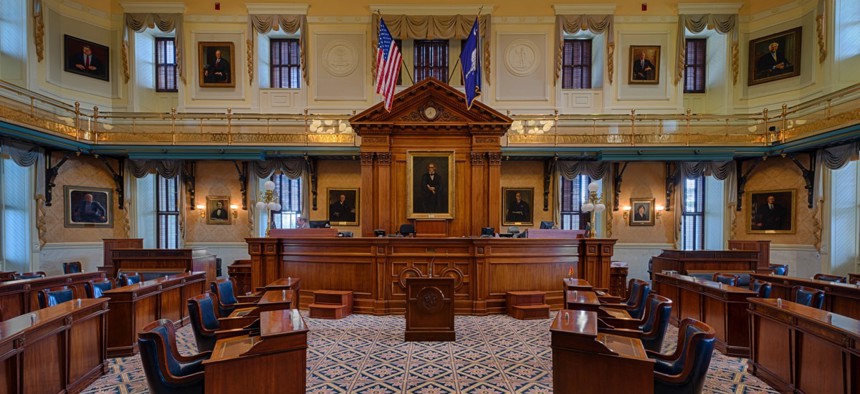S.C. Struggles With Pension Funding; New Governors Sworn Into Office in Ind., Mo.

South Carolina Senate chambers.
Also in our State and Local Digest: A push to raise Mont.’s gas tax; municipal panic buttons expand in Mass.; and a W.Va. city hall is a ‘total loss’ after a fire.
PENSIONS | Pension funding is set to be a priority in South Carolina’s 2017 legislative session. “The problem with pensions is that they’re underfunded,” said state Sen. Vincent Sheheen, a Democrat. “There has been poor leadership for at least the past decade that has put South Carolina in a catastrophic position in this area. Our employees pay some of the highest percentage of their salary into the pension system, more than anyone in the state. The state is going to have to increase their contribution to the system.” Estimates peg the state’s public employee pension debt at about $20 billion. [Florence Morning News via The State]
Local governments in Kansas may need to scrounge for money when employer contributions to the state pension system increase in 2019. It’s no longer clear how much the KPERS system will earn on long-term investments. [The Garden City Telegram]
STATE CAPITOLS | New gubernatorial administrations are officially getting underway this week in some states. On Monday, new Republican governors were sworn into office in Indiana and Missouri. [The Indianapolis Star; Kansas City Star]
GAS TAX | An association of contractors, labor unions, business consultants and local government officials is pushing for a 10-cent gas tax hike in Montana to help pay for road projects. “We haven’t adjusted that user fee, if you will, in 20 years,” said Darryl James, executive director of the coalition. [Bozeman Daily Chronicle]
INTERGOVERNMENTAL RELATIONS | North Dakota Gov. Doug Burgum wants state government out of “the property tax buydown business”—buying up local spending to lower property taxes. “[P]erhaps most dangerously, it acts as a subsidy which entices communities to make long term investments they may be ill equipped to afford,” he said. [The Jamestown Sun]
ORGANIZED LABOR | Nurses who are Pennsylvania state employees haven’t seen the 2.75 percent pay raise they were promised by Gov. Tom Wolf’s administration in an October labor agreement. For its part, the administration says retroactive raises are coming after possibly being held up by a new state law requiring the Independent Fiscal Office to sign off on proposed labor agreements. [PennLive]
ROADS | Drivers in New Jersey are still waiting for the completion of Route 55, a project that was meant to be finished in the 1960s as part of the “Cape May Expressway.” The highway in question has served so little purpose since it was built that drivers call it the “Road to Nowhere.” The $1.23 billion now being allocated to fund New Jersey’s road projects as a result of a recent gas tax hike has generated increased interest in getting the plans off the ground. [The Inquirer / Philly.com]
PUBLIC SAFETY | Panic buttons have already been installed in city hall offices in Chicopee, Massachusetts and City Council members have agreed to spend $2,000 to bring panic buttons to municipal offices outside city hall. [MassLive]
CITY HALLS | The City Hall in Rhodell, West Virginia, went up in flames after a fire early Monday morning and is a “total loss.” [Register-Herald]
Meanwhile, municipal employees in Nampa, Idaho, are cleaning up after a major roof leak at City Hall. [KBOI]
URBAN DESIGN | Starting today, Boston’s city-wide speed limit decreased from 30 to 25 miles per hour. The change was approved by the City Council last year as part of the city’s commitment to the international “Vision Zero” initiative, geared at eliminating traffic fatalities and serious injuries. Mayor Marty Walsh has committed to ending traffic fatalities and serious injuries by 2030. [Boston.gov]
INFRASTRUCTURE | The Oklahoma Department of Transportation will jack-up nine bridges along Interstate 35 to raise their clearance as part of a project that if successful, could be expanded to other similarly-designed bridges in the state. Jacking-up the bridges is seen as a potential cost-saving technique compared to rebuilding old bridges. [The Oklahoman]





